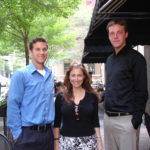When we walked into the Chicago Housing Authority headquarters we wondered if we were in the right place. The unassuming security guard, who questioned the validity of my Arizona driver’s license, didn’t seem to fit what I had imagined of the organization that is single handedly changing the face of public housing in Chicago. But after meeting Rayne Martin a few minutes later, I began to realize that public service is only made possible by people with a passion for making a difference.
 Rayne grew up in a tiny Louisiana town with a ridiculously small population of 200 people. It was here that Rayne discovered her passion for public service. After parting with a close-knit class of 12 graduates, she decided to attend Centenary, a small liberal arts college in Shreveport, Louisiana. At Centenary, Rayne began to organize and lead public service projects through Habitats for Humanity, Student Government and the Lighthouse, an after-school program for teenagers.
Rayne grew up in a tiny Louisiana town with a ridiculously small population of 200 people. It was here that Rayne discovered her passion for public service. After parting with a close-knit class of 12 graduates, she decided to attend Centenary, a small liberal arts college in Shreveport, Louisiana. At Centenary, Rayne began to organize and lead public service projects through Habitats for Humanity, Student Government and the Lighthouse, an after-school program for teenagers.
After graduating in 1996, Rayne moved to Philadelphia, where she became a VISTA volunteer. As such, she was given the duties of setting up community mediation centers in inner-city communities and peer mediation programs in high schools. In Philadelphia, Rayne confirmed her ability and drive to pursue a career in public service. “I was realizing that you don’t necessarily have to know what want to do with your life at 18, 20, 30, or 40,” Rayne told me of her time with VISTA, “but you should know what makes you happy, and you should spend your time working towards achieving that happiness.”
Rayne’s pursuit of her happiness soon led her to San Francisco, California where she did political fundraising and further community mediation work. When she decided to relocate to Chicago, With her public service ambitions now refined by her experience in the field, Rayne decided to relocate to Chicago. “When I was working in San Francisco as chief of staff for a county commissioner, I was exposed to different types of public service. Through my experience, I knew that I wanted to be in housing, and I had heard about the ‘Plan for Transformation’ going on in Chicago.” Rayne explained of how she came upon her current position, helping implement perhaps the biggest social welfare change in the nation since welfare reform.
The Plan for Transformation is the Chicago Housing Authority’s (CHA) ten-year initiative to demolish and renovate the 25,000 units of public housing notoriously plagued by mismanagement, racism, and most of all, poverty. Chicago is famous for its disastrous public housing developments, such as Cabrini Green, featured in the movies Candyman and Hoop Dreams as settings of poverty and violence.
What’s unique about the Plan for Transformation is that the CHA is building communities rather than stacking impoverished residents on top of each other in high rises. The CHA has taken the innovative, pioneering stance of acknowledging that public housing residents deserve to be integrated into the city. They are taking sweeping measures to raise the bar of living conditions for low-income families. It is the hopes of CHA to integrate citizens of different income levels in “mixed housing”, (where a third of the residents in the new building qualify for public housing, another third do not qualify but are below the market rate, and the remaining third is at the market rate). CHA is creating an environment that provides lower income residents with the tools to be successful and make a positive change in their new communities. Rayne’s interest in CHA’s plan lead her to designing the most elaborate, extensive relocation program in the nation.
“When I arrived in Chicago, I sent emails to anyone I could think of that would be able to put me in connection with the project. As a result, I got three or four names and numbers to call. But instead of approaching the phone calls as job solicitations, what I came up with was more like ‘Hi, I’m new to Chicago, and I would really like to talk to you and do an informational interview about the Plan for Transformation’. Most of the people were open to it.” Rayne continued, “I never left an interview without obtaining the name of another person I could talk to. Eventually I was led to the HR director for CHA, whom I called twice a week for three weeks straight. She probably thought that I was either crazy, or I really had something of value and eventually she gave me the chance to interview with a resident group, and they called and said they really liked me.”
“I met with my future boss,” Rayne told me of securing her position at CHA, “and we started to talk about the concept of relocation, and my position on it was that relocation should occur all the time with families because you should always be in a position to better your income and obtain better housing. In that conversation I realized they were looking for a director. So I was offered the job as a director, and when I started, it was a department of one, then it was a department of five, and now it has grown to forty.”
As Director of Relocation for the CHA, Rayne is in charge of managing a department of forty employees responsible for the relocation of 25,000 families while implementing social services. Prior to Rayne’s presence at CHA, the relocation process consisted of sticking a notice to a resident’s door to inform them that they had sixty days to relocate. Rayne implemented a year long relocation process in which CHA takes care of moving expenses and transportation assistance, making the move as easy as possible for residents.
When asked about what the most rewarding part of her job was, Rayne replied, “I would say every day that we move families into new housing, it’s exciting. We have families that have lived in a high-rise building for the last forty years. There’s no better joy than when a family like that has established employment, found child care and made a decision to make a positive change in their life, and moved to a brand new unit.”
Rayne’s passion to make a difference has impacted the lives of thousands of Chicago families through her work with CHA. She has helped initiate a powerful, influential change in public housing. CHA’s Plan for Transformation has received worldwide attention, with mayors from all over the country as well as government officials from South Africa traveling to Chicago to take note of the process. Now, seven years into the project, fifty high-rises have been closed and CHA is on schedule to finish the project in the allotted ten-year time frame.
Considering her accomplishments and experience with public service, I asked Rayne what advice she would offer to someone with the ambition of entering the field. She said to, “volunteer somewhere, because everyone wants a volunteer. It can be disillusioning at first, because we all have this notion of wanting to help and make the world better. But when you get in it, politics can take over, money has to be raised and some of those tactics can be disillusioning. So I think volunteering and understanding that there are some hardcore business things that happen just like in the business world is important to acknowledge.”
Interview
Last year I went to speak at my college. They made me sit with the freshman, so I was refreshed with what you’re talking about.
I’m actually from a small town in Louisiana with a population of 200. I went to a liberal arts school in Shreveport. A little under 800 people. It’s funny because I was thinking that I was going to talk to you guys…I was in student government in high school. When I was in Louisiana I had a really bad southern accent. Which I’ve lost because I’ve lived in Philly, San Francisco, and now Chicago.
We were all sitting around talking about what we were going to do with our lives. People were like ‘I want to be in office. I want to get money.’ It’s always a joke with everyone who was in the room because when it came to me I was like, ‘Y’all, I just want to help people.’ They’re like, ‘okay…that’s interesting.’
So I’ve always known that whatever I was going to do was going to be in public service. I decided that everything I needed to do was along those same lines. I was a VISTA volunteer when I graduated from college. I figured it would be a good way to live somewhere different while exposing me to different ways that I could serve the public. I kind of had these notions that I would have my own non profit by the time I was 30. With that experience, I actually came to this conclusion that I think is important for younger people, which is that you don’t always know when you’re 18, 20, 30, or 40 what you’re going to do with your life. Sometimes you just have to know what really makes you happy and find something, even though it will change over the years, that will allow you to be happy in your life. For me, it happened to be working to serve other people.
I knew that I wanted to do something helpful, but I didn’t know exactly what it was going to be.
Chicago Housing Authority is implementing one of the biggest social welfare changes in the country right now. Chicago is infamous for it’s public housing. Cabrini Green has been in a lot of movies. There’s also been a lot of mismanagement in public housing. A lot of racism.
About seven years ago, HUD came in and decided it would actually be cheaper for us to demolish and rebuild all of our public housing. So we’re in a ten year plan, the plan for transformation, to demolish and rebuild any and all public housing in Chicago.
My particular job is I manage a department that deals with all the relocation and implementation of social services. We’re responsible of the movement of 25,000 families through the ten year period. We’re in year seven right now. I’ve been here five years in October. That’s the longest I’ve been in any job actually. We’ve now closed about 50 high rises since we’ve been here. I’ve had the opportunity to move these families out into the private market, with the option to return back to the Chicago Housing Authority. I spearheaded some pretty sophisticated web based tracking systems to know where everyone is when they’ve moved. How much money we’ve spent moving families. What services they’re getting because a lot of the new communities there are work requirements. What’s unique about what we’re doing is that you have to be working within a year’s time frame so you can be more successful in your new housing.
A lot of the housing developments are mixed income. A third is reserved for public housing residents, a third for affordable, which are people who make more than public housing but not market rate, and then a third for market rate. That’s why it’s pretty significant and altering the world of public housing across the nation. Because CHA is doing ten of these communities in the city at one time. We’re saying it’s not good enough to isolate people and stack them on top of each other. They deserve to be integrated into the city like any other person would be. As a society, we should have higher expectations of impoverished people as we do any other average citizen. That’s what we do on a daily basis. It’s phenomenal. I’ve worked for politicians as their chief of staff. I’ve worked for foundations raising money. I’ve worked for campaigns. I would have never imagined I’d be able to do something that is just so altering for people in a positive way.
When you go into the buildings and you see the people who have lived in these just, shitty conditions quite frankly over the years, it’s sad. It’s a good opportunity to help somebody. Not everyone has a particular time where they can make a significant change in their life. What we try to do is educate people that this is their big opportunity. We have a lot of money to utilize their services, so this is the time to make a positive change in their life. We really try to help people get into a better house and get them services to put them in a higher income bracket. That’s the plan.
We’re going to be significantly done in ten years. My guess is that it will take longer than ten years. I’ve worked with a lot of government and non profit organizations, and there are a lot of people here who are deranged, like myself. You have to really be one of those people who work long hours and want to get something done. There’s a lot of doers here. There is a lot of creative thought. And we’re a government entity. Government entities are known for creative thought and getting things done quickly and catering to the public. But this organization is.
We’re going to finish the plan. Our CEO is dead set on finishing. I feel that we will. If I didn’t feel like it, or the mission wasn’t right, I wouldn’t stay here. But I really feel like it is.
It’s funny because in terms of talking with people who are trying to figure out what to do, you have to put yourself out there. When I was in San Francisco I was the chief of staff for a county commissioner. That gave me the opportunity to do all different types of public service. I knew I wanted to be in housing. I knew I wanted to come to Chicago. And I knew about the plan for transformation.
What I did is when I was in California, I emailed anyone I could think of to say that I wanted to be in housing in Chicago. I got a list of 4 people and called them to say that I was new in town to do an informational interview. What I learned was that everyone likes to talk about themselves. People like to talk about what they do and how they do it. So people were open to having me come in, and at the end I’d ask to talk to someone else. Eventually I got the HR directors name here.
Because it’s not always easy to find a job in the political organization. It’s not like there’s all these job openings. I called the HR director twice a week for about three weeks. She figured that I was either crazy or had something of value. So finally I did an interview. I interviewed with a resident group actually. They called and said they really liked that young white girl that interviewed. It’s a little distinct around here in terms of environment.
And then, at that point and time I met my boss. Knowing a little about what was going on, but not much, I thought that relocation should happen all the time for families. You should always be in a position to earn an income and get in better housing. Eventually, you should be able to work yourself out of public housing. From there, I got offered the job as a director.
When I started, the department was 1 person. Then 5. Then 20. We’re now at about 40 people. I’m not a big religious person, but I believe I’m in Chicago to do this job. Absolutely. I wouldn’t want someone to have the same compassion for the residents, and the same ability to really focus and get stuff done, to be in this position because it is really stressful. You have to really care about people in order to do what we do.
I would say that every day we get to move families into housing, it’s exciting. Because we have families that have lived for forty years in a high rise building that wasn’t taken care of. There’s no better joy than when a family like that has gotten a job, gotten their kids in childcare, and made a decision to really make a change in their life, and they move to a brand new unit.
We’re talking about a brand new washer and dryer. I have a woman in my department who has been here thirty years. She has a speil with the residents: ‘Wouldn’t you want to sit on a toilet that no one has sat on before?’ It gets them all excited. There’s nothing better than when a resident has made a change, gotten in a positive position, and has been able to move into one of these brand new places.
I would say the toughest part is when you run across seniors who have been in the housing for thirty or forty years. For them, even though for us it’s rental housing, if you’ve lived in a location for forty, fifty years, you still consider that your housing. There’s also gang issues. You have to be careful about so and so moving from one development to the other. We’re real cautious about that.
What’s also disheartening is when you have so much resource, and so much effort to give someone a job and new housing, and you have people who don’t want to change. They just don’t want to see anything positive. That’s tiring. You come in day after day after day stressed out trying to motivate everyone to get their stuff done, and you know there’s some people who won’t take advantage. That’s probably the most difficult.
You just keep going. I can’t speak highly enough about my staff. They’re the ones who deal with the residents on a daily basis. I try to make them feel good and appreciated. They know that even if they don’t get appreciated all the time in the field, there are people at the office who care about them and their good work. We do a lot of that internally.
In terms of process, Chicago has the most elaborate, extensive relocation program in terms of what we offer. One of the first things I had to do is create a process because there were people who were getting notices on their door saying they had 60 days to move. I came in and made that a year long process with contractors who take residents to see apartments. We pay for the move and the security deposits. We pay for all of their utilities to be set up. We had to create all that process.
It’s funny because I just don’t get scared. I drive a Jeep and I never lock it and I never zip it up. My staff thinks I’m crazy because I drive this Jeep into the projects. But this is probably where a lot of my passion comes from. I really firmly believe that how you treat people and how you put things out there is what happens to you in the world. I don’t necessarily think it’s fair that in one environment is not fair in other environment.
For example, I was at a moment where we were having some issues on board with moving. We had a big meeting, and a lot of the people who did not live in the building were opposing the move. That’s one thing I’m opposed to because my take is that you’re dealing with these people’s lives, and they need to decide for themselves what they want to do. People who come from the outside don’t always have the best interests for the residents at heart.
At the meeting, these guys come in and I see them come in. Apparently they’re part of the gang that supports the building. They sit around and they wanted to ask a question. As soon as they ask a question, I guess that’s code to everyone else that it’s time to go. So the staff all leave. The residents all leave. And I’m still up there like, ‘If anyone wants to talk about this, or has questions, I’m still here.’
Our CEO called me because someone called him about the situation. He was like, ‘You need to get out of that development right now! Gangs are in there!’ I haven’t really felt unsafe, honestly. I’ve been in all the developments. I’ve been in Cabrini. When the building closes I’m the one locking the building and making sure everyone is out of the building. I’m cautious. I’m not just walking around with a million dollar purse or this bling bling jewelry hanging off. But honestly, I never feel fear about it.
I’ve always been a talker. So it comes naturally. I believe if you’re real with people, and show you really care, people will feel that. Poor people in particular will feel that. When you’re poor, a lot of people make money off of you. Quite frankly. There’s all these people in government who get paid to issue welfare to you, and food stamps and healthcare. My salary comes off the fact that I’m working for poor people. There’s attorneys who represent impoverished. When you’re that sort of person who has dealt with that your whole life, not everyone who deals with you is real. There are many times when ulterior motives lie beneath their actions. They could be doing it because they have to in order to make their paycheck.
I believe that there’s a higher level of…they can tell easier if you’re bullshitting because they’ve dealt with it so often. So if you’re true and honest with people, we do it a lot in this department where we’ll be like, ‘That’s great, I would love to help you with that, but I can’t do it.’ Because there’s nothing worse than having someone making a major change, and you’re committing and you’re promising and then never being able to come through. I would say that’s what I feel about that.
How do I define passion? Wow. I’d like to think passion happens every day everywhere. Right? I think that passion is part of an outlook. I think you have to know what makes you happy. I think a lot of times people get confused what they want to do and what really makes them happy.
For instance, people might say they’re looking for a job in sales. And if those people think about what they do in a day, we do ten million things a day, what moment are you happiest doing something?
I have a friend who has kids and coaches hockey in his spare time. That really is when he’s the happiest. So what is it about that experience that you could then do something in terms of an every day thing?
How would I define it? I don’t know. Maybe it’s so ingrained in me for so long that my life should be making other people feel better about their life that it’s really hard for me to say or even define what that feeling is. You know what I mean? I do believe that people who are not really passionate about what they do are disrespecting themselves if they don’t do something about it. A lot of fear of trying something new. A lot of fear trying something less secure because that’s what you’re supposed to do. I really feel that people owe it to themselves that they should feel passionate about what they do all the time. No one doesn’t deserve that. Unfortunately, I don’t see a lot of people who feel that way.
The other thing that makes me passionate about what I do is translating my interest in having people be better off in their life and feel happier with who they are than my friends. I do a lot of work with my friends on professional coaching with job changes and shopping for certain things so they feel and look better. I do things more on a personal level than things that are more organized.
I would say that one of the best things to do is volunteer somewhere. Everyone wants volunteers. There’s never enough staff. It can be disillusioning at first because we all have this notion of wanting to do this and making the world better. Kind of like I said with ‘just wanting to help people.’ Then you get in it and there’s politics that go on here just like in the business world. There’s money that has to be raised and there are things that are done to raise money that people are disillusioned with. I think volunteering and understanding that there are still some hardcore business things that are done in that world as there are in the business world. That’s important to acknowledge.
And it’s important to change it up in this work. Because this work is very emotionally taxing as well. You see so much going on in the world that the burnout rate is very high. It’s important for people to recognize that and do something about it.






